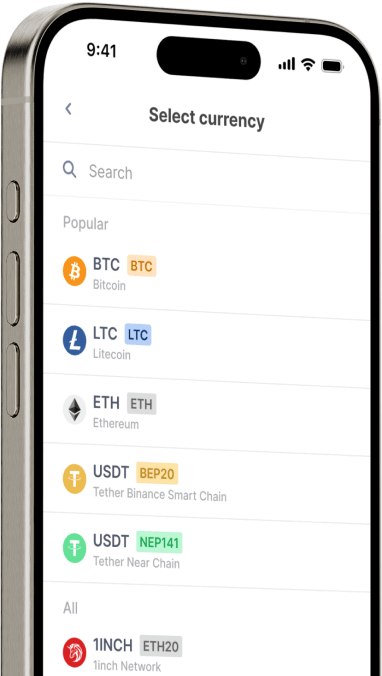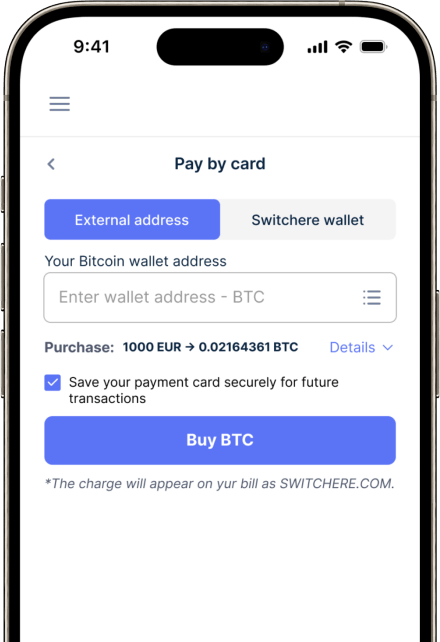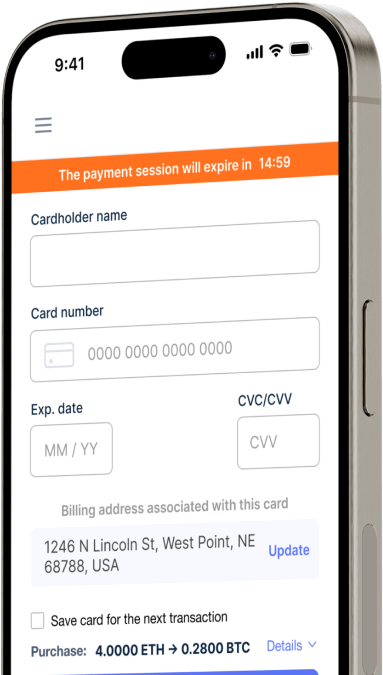Convert
Saudi riyal (SAR) to Binance USD (BUSD) Instantly
Purchase Binance USD (BUSD) with Saudi riyal (SAR) easily at Switchere and benefit from fast, secure transactions.
About
Binance USD (BUSD)
BUSD (BUSDBSC) is a regulated, fiat-backed stablecoin pegged 1:1 to the US dollar, designed to provide price stability within the volatile digital asset landscape. Issued by Paxos Trust Company in partnership with Binance, BUSD aims to offer a reliable medium of exchange and store of value. The "BUSDBSC" ticker specifically denotes its presence as a BEP-20 token on the BNB Smart Chain, a high-performance decentralized network facilitating extensive DeFi applications. The core technology behind BUSD relies on transparent, audited US dollar reserves held in dedicated accounts, ensuring each token is backed by an equivalent amount of fiat currency. This contrasts with algorithmic stablecoins, offering a different approach to maintaining its peg and cryptographic security.
The primary utility of BUSD, particularly its BUSDBSC variant, is to enable seamless transactions and participation in the BNB Chain's ecosystem with minimal price risk. Its tokenomics are straightforward: new BUSD is minted when dollars are deposited with Paxos, and burned when redeemed, maintaining the 1:1 backing. Prominent use cases include trading against other cryptocurrencies on exchanges like PancakeSwap, serving as collateral in lending and borrowing protocols, yield farming within various DeFi applications, and facilitating peer-to-peer payments. As an NYDFS-approved (for the Paxos-issued Ethereum version) and widely adopted stablecoin, BUSD plays a significant role in providing liquidity and a trusted, compliant digital dollar representation on various blockchain technology platforms, acting as a foundational element for many Web3 infrastructures and on-chain financial activities.
Buy Other 150+ Cryptocurrencies for Saudi riyal (SAR)
Other Coins for Saudi riyal (SAR)
-
SAR to ZRX
-
SAR to 1INCH
-
SAR to AAVE
-
SAR to ACH
-
SAR to ALGO
-
SAR to TLM
-
SAR to ANKR
-
SAR to APE
-
SAR to NFT
-
SAR to API3
-
SAR to APT
-
SAR to ARPA
-
SAR to AUDIO
-
SAR to AVAX
-
SAR to AVAX
-
SAR to AXS
-
SAR to BADGER
-
SAR to BAL
-
SAR to BNT
-
SAR to BAT
-
SAR to BNB
-
SAR to BUSD
-
SAR to BSW
-
SAR to BSV
-
SAR to BLUR
-
SAR to BONE
-
SAR to CTSI
-
SAR to CELR
-
SAR to CELO
-
SAR to CEL
-
SAR to LINK
-
SAR to CHZ
-
SAR to CHR
-
SAR to C98
-
SAR to COMP
-
SAR to CFX
-
SAR to PEOPLE
-
SAR to CVX
-
SAR to ATOM
-
SAR to CTC
-
SAR to CRV
-
SAR to DAI
-
SAR to DASH
-
SAR to MANA
-
SAR to DENT
-
SAR to DGB
-
SAR to LEASH
-
SAR to DYDX
-
SAR to XEC
-
SAR to EOS
-
SAR to ETC
-
SAR to ENS
-
SAR to ETHW
-
SAR to FET
-
SAR to FIL
-
SAR to FLOKI
-
SAR to GALA
-
SAR to GNO
-
SAR to ONE
-
SAR to HBAR
-
SAR to HOT
-
SAR to HOOK
-
SAR to ICX
-
SAR to ILV
-
SAR to IMX
-
SAR to INJ
-
SAR to ICP
-
SAR to IOST
-
SAR to IOTX
-
SAR to JASMY
-
SAR to JST
-
SAR to KAVA
-
SAR to KCS
-
SAR to KSM
-
SAR to KNC
-
SAR to LDO
-
SAR to LQTY
-
SAR to LPT
-
SAR to LOOKS
-
SAR to LRC
-
SAR to LUNA
-
SAR to MKR
-
SAR to MASK
-
SAR to EGLD
-
SAR to ALICE
-
SAR to NEAR
-
SAR to XEM
-
SAR to NEXO
-
SAR to NOT
-
SAR to NMR
-
SAR to OKB
-
SAR to OMG
-
SAR to ONT
-
SAR to EDU
-
SAR to OP
-
SAR to OGN
-
SAR to CAKE
-
SAR to PAXG
-
SAR to PENDLE
-
SAR to DOT
-
SAR to POL
-
SAR to QTUM
-
SAR to QNT
-
SAR to RDNT
-
SAR to XRD
-
SAR to RVN
-
SAR to REN
-
SAR to RSR
-
SAR to RLC
-
SAR to RPL
-
SAR to SFP
-
SAR to SHIB
-
SAR to SKL
-
SAR to SXP
-
SAR to STND
-
SAR to STG
-
SAR to XLM
-
SAR to GMT
-
SAR to STORJ
-
SAR to STMX
-
SAR to SUSHI
-
SAR to SNX
-
SAR to USDT (NEP141)
-
SAR to USDT (FA2)
-
SAR to USDT (TRC20)
-
SAR to USDT (JETTON)
-
SAR to USDT (SPL)
-
SAR to USDT (ERC20)
-
SAR to USDT (AVAC)
-
SAR to USDT (BEP20)
-
SAR to USDT (Polygon)
-
SAR to XTZ
-
SAR to GRT
-
SAR to SAND
-
SAR to TFUEL
-
SAR to THETA
-
SAR to RUNE
-
SAR to TON
-
SAR to TUSD (BEP20)
-
SAR to TUSD (TRC20)
-
SAR to TWT
-
SAR to UOS
-
SAR to UMA
-
SAR to UNI
-
SAR to USDC (SPL)
-
SAR to USDC (Polygon)
-
SAR to USDC (OP)
-
SAR to USDC (TRC20)
-
SAR to USDC (BEP20)
-
SAR to USDC (BEP20)
-
SAR to USDC (AVAC)
-
SAR to USDC (ARB)
-
SAR to USDC (ERC20)
-
SAR to VET
-
SAR to VRA
-
SAR to WAXP
-
SAR to WOO
-
SAR to WLD
-
SAR to WBTC
-
SAR to WMINIMA
-
SAR to XDC
-
SAR to YFI
-
SAR to YGG
-
SAR to ZIL
How to Buy Binance USD (BUSD)
Frequently Asked Questions
-
What exactly is the SAR/BUSD pair and its primary function?
The SAR/BUSD pair represents a direct fiat on-ramp allowing users to purchase Binance USD (BUSD), a 1:1 USD-backed stablecoin, using the Saudi Riyal (SAR). Its primary function is to provide a gateway for users in Saudi Arabia to enter the digital asset ecosystem with a regulated, price-stable token. BUSD is issued by Paxos and is native to multiple blockchains, including the Binance Smart Chain as a BEP-20 token.
-
What are the security considerations when converting SAR to BUSD?
Security is paramount. Always use a reputable cryptocurrency exchange that complies with SAMA regulations and global AML standards. Enable two-factor authentication (2FA) on your account. When withdrawing your BUSD, double-check the BEP-20 wallet address for accuracy. For significant amounts, consider transferring to a secure, non-custodial digital wallet where you control the private keys to mitigate counterparty risk.
-
Are there typical fees associated with a SAR to BUSD blockchain transaction?
The process involves two main stages with potential fees. First, the fiat on-ramp platform may charge a deposit or purchase fee for converting SAR via bank transfer or card. Second, once you have BUSD, withdrawing it to an external digital wallet incurs a network fee. If you withdraw BUSD as a BEP-20 token on the Binance Smart Chain, this network fee is typically very low compared to other networks like Ethereum.
-
What are the common payment methods for buying BUSD with SAR on cryptocurrency exchanges?
To purchase the BUSD digital asset with SAR, most regulated exchanges and P2P platforms support local bank transfers from Saudi banks. Additionally, debit and credit card purchases, particularly using the local Mada payment network, are often available. Always verify the accepted payment options on your chosen trading platform, as they can vary based on KYC/AML compliance levels.
-
Why might a user choose BUSD over other stablecoins when using Saudi Riyal?
Users often prefer BUSD due to its status as a regulated stablecoin, issued by the New York-based trust company Paxos. This provides a higher degree of trust and transparency, as it is backed by fully audited reserves. Furthermore, its deep liquidity and integration within the Binance ecosystem, including the Binance Smart Chain (BSC), make it highly useful for DeFi applications and trading with low blockchain transaction fees.
-
What is the importance of BUSD's BEP-20 token standard in the context of a SAR purchase?
After acquiring BUSD with SAR, its utility is often realized on-chain. The BEP-20 standard means the token is compatible with the Binance Smart Chain (BSC) ecosystem. This allows users to quickly and cheaply transfer their BUSD to a self-custody wallet and interact with a vast range of decentralized finance (DeFi) protocols, such as lending platforms, decentralized exchanges, and yield farming applications, with high transaction throughput.




